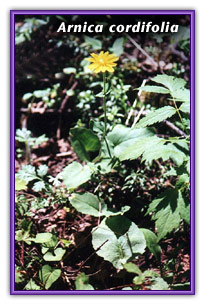 Arnica is also commonly called leopard's bane. The arnica plant has a bright yellow, daisy-like flower that blooms around July. Preparations made from the flowering heads have been used in homeopathic medicine for hundreds of years. It is popular in Germany and over 100 drug preparations are made from the plant. Arnica is a perennial that is protected in parts of Europe.
Arnica is also commonly called leopard's bane. The arnica plant has a bright yellow, daisy-like flower that blooms around July. Preparations made from the flowering heads have been used in homeopathic medicine for hundreds of years. It is popular in Germany and over 100 drug preparations are made from the plant. Arnica is a perennial that is protected in parts of Europe.
The active components in arnica are sesquiterpene lactones, which are known to reduce inflammation and decrease pain. Other active principals are thymol (an essential oil), flavonoids, inulin, carotenoids and tannins.
Arnica works by stimulating the activity of white blood cells that perform much of the digestion of congested blood, and by dispersing trapped, disorganized fluids from bumped and bruised tissue, joints and muscles.
Arnica is known to stimulate blood circulation and can raise blood pressure, especially in the coronary arteries. The plant is used externally for arthritis, burns, ulcers, eczema and acne. It has anti-bacterial and anti-inflammatory qualities that can reduce pain and swelling, improving wound healing.
Part Used: Extract of the blossoms
Common use: It is typically rubbed on the skin to soothe and heal bruises, sprains, and relieve irritations from trauma, arthritis and muscle or cartilage pain. Applied as a salve, arnica is also good for chapped lips, irritated nostrils and acne.
Care: Grows in moist, sandy soil with adequate drainage. Likes full sun.
Toxicity: The internal use of Arnica is not suggested. It can cause vomiting, weakness, increased heart rate and nervous disturbances.

![]()
![]()
![]()
 Arnica is also commonly called leopard's bane. The arnica plant has a bright yellow, daisy-like flower that blooms around July. Preparations made from the flowering heads have been used in homeopathic medicine for hundreds of years. It is popular in Germany and over 100 drug preparations are made from the plant. Arnica is a perennial that is protected in parts of Europe.
Arnica is also commonly called leopard's bane. The arnica plant has a bright yellow, daisy-like flower that blooms around July. Preparations made from the flowering heads have been used in homeopathic medicine for hundreds of years. It is popular in Germany and over 100 drug preparations are made from the plant. Arnica is a perennial that is protected in parts of Europe.